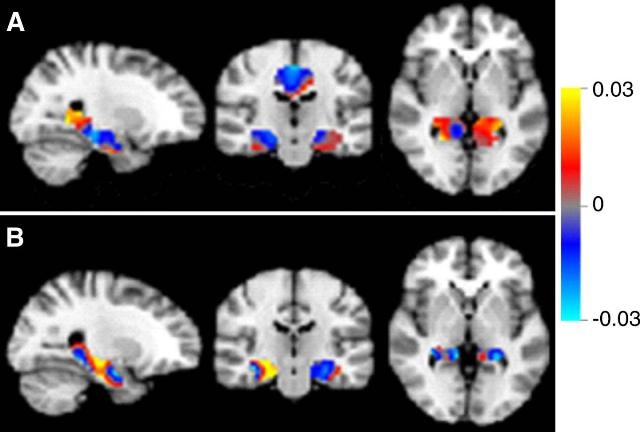Jul 7 2016
Machine learning refers to one specific kind of artificial intelligence that enables computer programs to learn when exposed to fresh data without being programmed. Researchers in The Netherlands have recently incorporated machine learning methods in a unique MRI technique that is capable of measuring the tissue absorption rate, or perfusion, of blood all over the brain to identify early forms of dementia like mild cognitive impairment (MCI), Radiology.
 Discrimination maps for classifying MCI subgroups, inside the masks that resulted in the highest accuracies. A: between patients with MCI that converted to AD (MCIc) and subjects with SCD; B: between MCIc and patients with MCI that remained stable (MCIs). CREDIT: Radiological Society of North America
Discrimination maps for classifying MCI subgroups, inside the masks that resulted in the highest accuracies. A: between patients with MCI that converted to AD (MCIc) and subjects with SCD; B: between MCIc and patients with MCI that remained stable (MCIs). CREDIT: Radiological Society of North America
"MRI can help with the diagnosis of Alzheimer's disease," said principal investigator Alle Meije Wink, Ph.D., from the VU University Medical Centre in Amsterdam. "However, the early diagnosis of Alzheimer's disease is problematic."
Scientists have known for a long time that Alzheimer's disease is a very slow process and that the brain experiences functional changes even before the structural changes are revealed on imaging results. Physicians are yet to discover an ultimate method to identify individuals with early dementia or detecting the cases of mild cognitive impairment that will lead to Alzheimer's disease.
With standard diagnostic MRI, we can see advanced Alzheimer's disease, such as atrophy of the hippocampus, but at that point, the brain tissue is gone and there's no way to restore it. It would be helpful to detect and diagnose the disease before it's too late.
Alle Meije Wink, PhD., VU University Medical Centre
Researchers, in their new study, used machine learning methods for arterial spin labeling (ASL) imaging, which is a unique type of MRI. ASL MRI is used to produce images referred to as perfusion maps, which display the amount of blood that is transported to different regions of the brain.
The automated machine learning program is tuned to detect patterns from these maps, thus allowing categorization of patients based on their differing cognitive impairment levels and predicting the level of Alzheimer's disease in unseen or new cases.
Participants in the study include 260 of 311 individuals from the Alzheimer Center of the VU University Medical Center dementia group who went through ASL MRI conducted between October 2010 and November 2012.
The study group was made up of 100 patients who were diagnosed with potential Alzheimer's disease, 100 patients with subjective cognitive decline (SCD), 60 patients with mild cognitive impairment (MCI) and 26 healthy controls.
The two early stages of dementia, MCI and SCD, are diagnosed according to the complexity of cognitive symptoms, such as thought- and decision-making issues and memory loss.
The automated system effectively identified participants with SCD, MCI and Alzheimer's disease. The researchers used classifiers based on the automated machine learning training to predict the Alzheimer's progression or diagnosis of single patients with high accuracy degrees extending from 82% to 90%.
"ASL is a promising alternative functional biomarker for the early diagnosis of Alzheimer's disease," Dr. Meije Wink said.
Wink further added that automated machine learning methods have the potential to be used a potential screening tool.
ASL MRI can identify brain changes that appear early in disease process, when there's a window of opportunity for intervention. If the disease process from SCD to MCI to Alzheimer's disease could be intercepted or slowed, this technique could play a role in screening.
Alle Meije Wink, PhD., VU University Medical Centre